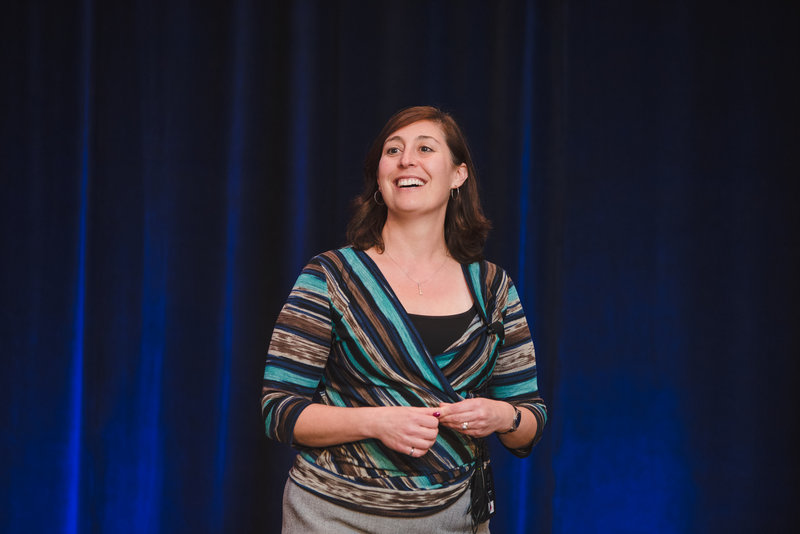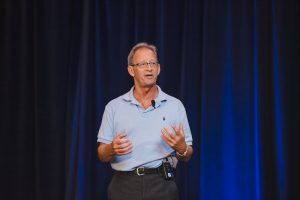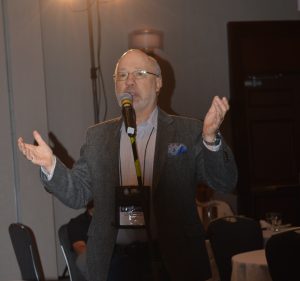
What is more important: a focus on reliability or focus on maintenance practices?
December 22, 2016 | By Rehana Begg

 MRO’s Counterpoint columnists took to the stage at this year’s MainTrain conference, which was held September 19 – 22 in Toronto. The annual conference, organized by the Plant Engineering and Maintenance Association of Canada (PEMAC), is Canada’s largest maintenance and physical asset management conference and a veritable site for professional development and networking. This year’s conference theme was “Sustainable, Effective, Evolving.”
MRO’s Counterpoint columnists took to the stage at this year’s MainTrain conference, which was held September 19 – 22 in Toronto. The annual conference, organized by the Plant Engineering and Maintenance Association of Canada (PEMAC), is Canada’s largest maintenance and physical asset management conference and a veritable site for professional development and networking. This year’s conference theme was “Sustainable, Effective, Evolving.”
During the Counterpoint Panel, three pairs of debaters were asked to argue perspectives on three separate topics. Each team was in the hot seat for 20mins before opening the floor to questions. A live poll at the end of the session gave the audience a chance to weigh in on whether they were swayed by the panellists.
Our regular MRO Counterpoint columnists, Mark Barnes and Jeff Smith tackled the topic: “A comprehensive preventive maintenance program will result in lower maintenance costs every time,” while Boudewijn Neijens, CMO at Copperleaf, Paul Daoust, Lead Engineer, Ops Integrity, TransAlta, elected to spoof their topic,
“Where will asset management deliver the biggest bang for the buck for companies that implement it?”
What follows is an edited transcript of the debate presented by Susan Lubell, Principal, Steppe Consulting Inc., and Cliff Williams, Corporate Maintenance Manager, ERCO Worldwide.
Question: What is more important, a focus on reliability or focus on maintenance practices?

Susan Lubell, Steppe Consulting Inc. makes a case for a focus on maintenance.
The Case for Maintenance
Let’s think about this from the point of view of why it is more important to cover maintenance practices. Asset management is about getting value from our assets. What does that mean? It actually means we have to know what assets we own; we need to know what condition they are in; and what value they bring to our organization. This is from the perspective of safety, health, the environment,
regulatory, production or economics. These are all of the things we need to know if we are going to drive value from our assets. How do we maintain those assets to get the maximum value out of it?
Do you hear the word reliability there? I only hear maintenance. So, how do we do this? We get back to the fundamentals of our maintenance practices. We need our asset registry, we need to be able to find those pieces of equipment, we need to have our planning and scheduling, our work identification. we need to have our PMs, our predictive maintenance, and we need to have that all set up. There’s no point in doing fancy analytics when the underlying data isn’t there, and no need to apply accuracy and precision that isn’t there to begin with. I think we need to get back to the fundamentals of our maintenance practices by doing our basics well.

Cliff Williams, Corporate Maintenance Manager, ERCO Worldwide, defends a reliability focus.
The Case for Reliability
Sue, you’re right! But hang on a minute, I just thought about something: How many people are involved in maintenance? You’re going to get involved whether you like it or not. In how many organizations is maintenance the service department? How many people have operations as their customers?
This is where the rubber hits the road. Are they really our customers? Are we really a service to these people? When we think about maintenance practices – Sue described it perfectly – we really have to get the fundamentals right. And if we get that right, and we implement a comprehensive maintenance program, we’d be perfect. Except…
What percentage of failures would you guess were attributed to poor or lack of maintenance? Would you venture 80 per cent, 90 per cent, 70, per cent, or 50 per cent? When Dupont did a study (there are a number of studies, but this is the one I am familiar with), they looked at reliability and failure of their equipment. They found that number to be around 25 per cent.
So, if we have this absolutely perfect maintenance department, and everything is perfect, we are going into 25 per cent of our problems stemming from maintenance. So should we focus on maintenance, or should we focus on reliability?
Who is involved with reliability? If 25 per cent belongs to maintenance, who does the rest belong to? Well, we have good operators, with good SOPs [standard operating procedures]. They never ever push the button before they’re supposed to! They never open a valve too late!
At one plant I said to the maintenance lead, “Give me your plan for next year.” He said, “We spend $80K on mechanical seals.” I said, “How do you figure that out? He said, “Someone is going to leave a valve closed, and when we start up there will be no cooling water… I don’t know when, but it’s going to happen.”
This illustrates the huge impact on reliability when operators don’t run equipment properly, don’t operate properly.
Getting back to the question that was brought up: Where does design fit in? I can bring out photographs that show manmade covers that are underneath stairwells, with valves up in the air that need to be calibrated, and a great design team that says, “Yeah, we saved some money.”
I know of an instance where we put in 100 valves, knowing that they were problematic. When I asked the project manager why he put them in, he said, “Because we would have gone over budget and it would cost my project.”
So that was driving unreliability.
What we need to focus on is partnerships by talking to each other and working together. For those of you who work as a service group within your organization, why not turn that around and say, “I am going to be a partner from now on.” If you can work with that, you can build and change the culture towards collaboration. And you can improve the culture much more by improving reliability more so than you can by concentrating on maintenance.
QUESTIONS FROM THE AUDIENCE

Len Middleton, Consultant, Asset Management Solutions, wants to know how to prioritize.
Len Middleton, Consultant, Asset Management Solutions: “Are we arguing one side or do we need some sort of balance between them?”
SL: I think for our maintenance practices, we need to do the right things first, and then become efficient at them. If we are not effective at doing our maintenance practices, our planning, our scheduling, our predictive maintenance, our preventive and setting the right maintenance, if we’re doing the wrong work, but doing it really well, then we’re not going to get the benefit of it.
I think a big part of this is focusing on the effectiveness of our maintenance practices – do the right things, learn to do them well. Once we have the fundamentals in place, I would argue Cliff’s side of the argument and then evolve our way into applying some of the more sophisticated reliability practices. But we do have to start with the foundational part – get our maintenance right.
CW: I believe it’s a balance. We have to have that balance. It’s a partnership. And like any relationship, you need to have balance.
Len Middleton: “Back to Sue’s point. I appreciate the effectiveness versus the efficiency in general, but at what point do we have to be effective? Do we have to be 100 per cent effective? Or is 95 per cent close enough before I can work on efficiency? With a limited number of resources, where do I prioritize”
SL: You don’t have to be 100 per cent perfect. You need to focus on the effectiveness of the work you’re doing, or you’re taking all those valuable resources, whether they’re people or dollars that you’re putting on things that add value to your organization. Don’t’ drive the max value out of your assets.
CW: There’s a saying that goes: It’s difficult to remember that the goal of the exercise is to drain the swamp when you’re up to your armpits in alligators. Sometimes you have to kill some alligators in order to become efficient at draining the swamp. So there is a balance point. When you get there – when you’re in control of more things than you’re out of control – then you can optimize. But initially, you have to become effective.
MainTrain 2017 will be hosted in Saskatoon (September 25-28, 2017). For more information, visit www.pemac.org.
